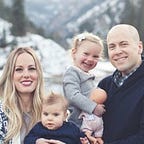It’s Not About You
Dear Utah,
I love you.
But we are really blowing it.
First let me quickly tell you why I love you. I grew up here (in Farmington), and went to college here (BYU). I left for the east coast after graduating, and quickly came to appreciate in a new way all that makes Utah special.
I came back 10 years ago because my wife and I wanted to raise our family here, and we’ve felt happy with that decision every single day since.
I’ve been fortunate to work in Utah’s software and technology sector, which has given me amazing opportunities.
In short, so much of what is great about my life comes as a direct result of Utah’s unique approach to community, family and business.
Which is why it’s been so sad to me to see the way we’re currently botching our reaction to the COVID crisis.
If you’d have asked me at the beginning of the pandemic how Utah was going to fare, I’d have told you that our community values of cooperation, common sense, and caring for vulnerable would enable us to handle it more effectively than any other state in the U.S.
Unfortunately, this has not turned out to be true. While our economy has fared better than most, we are now making national news because it seems highly likely that in the very near future we’ll be rationing health care for COVID, much as hot spots like Northern Italy and New York City did during the early days of the crisis.
I heard this news while I was with a family member in their 70s, and saw the look in this person’s eyes as it dawned on them that if they get COVID, they would very likely be turned away from needed care at a hospital. I can’t get their expression out of my mind.
That we have arrived at this point represents an enormous failure on our part — a betrayal of the values that we espouse and that make us unique. I know that we can do so much better.
The problem is that we’re thinking about it the wrong way. In Utah, we’re big on personal responsibility and consequences, and we’re skeptical of people using government power to make us do things. These are wonderful principles, and they’re part of what makes Utah special.
In this case, though, too many of us are fixating on these principles and ignoring another Utah core value: protecting vulnerable people.
Most people reasonably see their personal risk of severe illness or death from COVID as being very low, which leads them to continue living much as they did before COVID. They think, “It’s my decision to forego a mask and distancing, and if I get sick, I’ll deal with the consquences.”
Unfortunately, there are many around us — the elderly, the immunosuppresed, those with chronic health problems, and health care workers — who are at much greater risk.
While people in these groups can and should do their best to avoid others, they’re unable to completely self-isolate, which brings them into contact with other people, including you.
Your decision about whether to wear a mask and socially distance isn’t about protecting yourself. And it’s not about the government. It’s about protecting the vulnerable.
A refusal to wear masks and socially distance and avoid high risk situations on your part directly and indirectly threatens their health and safety.
In the first place, a refusal to wear masks and socially distance increases the probability that you will contract COVID, and with it the probability that you will transmit it to a vulnerable person, who is much less likely to recover from it than you are. You’ll also be much more likely to transmit it to a health care worker or family member of a vulnerable person, who will then transmit it to that person.
In the second place, in the event you become seriously ill — which is not likely, but still happens far too often — as a young, healthy person, you’ll be at the front of the line for precious health care resources, which won’t then be available for a higher risk, older person.
I know none of us wants to be responsible for making a vulnerable person seriously ill, or cause their death. And yet, when we choose not to mask up and socially distance, that’s exactly what we’re risking.
I’ll end with a thought experiment: if you came upon someone who was choking on food, would you:
A. Stop and ask whether the government, through law and regulation, compels you to perform the Heimlich;
B. Decide that you don’t need the Heimlich because you’re not choking; or,
C. Perform the Heimlich on the choking person to save their life?
Please, take a moment and think about whether you want to be someone who is willing to make a small personal sacrifice in order to protect the most vulnerable among us. It’s really as simple as that. It’s not about your own personal risk, or whether the government should ask you to do something or not. It just comes down to our willingness to protect other people.
And I know that in Utah, we work to protect people who need it.
Sincerely,
Davis Bell
PS: A smart friend pointed out to me that if you’re concerned about government intervention, then the best thing to do is wear a mask. That will keep case counts down, and will then relieve governments of the need to decide about whether to impose more foreceful measures like mask mandates and lockdowns.
PPS: There are all kinds of things that we’re compelled to do legally but which we do not because of legal compulsion but because they’re the right thing to do. You’re legally required to feed and care for your kids, but we don’t think about that; we do it because it’s obviously the right thing to do.
